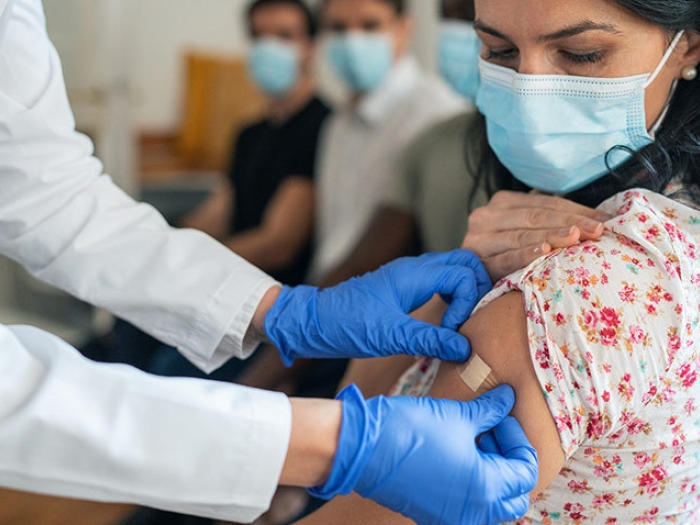A new paired booster offers more protection from the omicron variant.
Transcript
Host (00:00):
Welcome to the Michigan Medicine News Break, your destination for news and stories about the future of healthcare. Today, a boost just in time for fall; updated COVID shots are now available. A new paired booster offers more protection from the Omicron variant.
Host (00:16):
Earlier this month, the Centers for Disease Control and Prevention and the Food and Drug Administration announced the approval of a new and improved booster shot for COVID-19. The new shot protects against the original variant of SARS‑CoV‑2, and the Omicron variants BA.4 and BA.5 that are currently circulating. "The bottom line is this booster is replacing the shots we've been using because it protects against the Omicron variant better," said Pamela Rockwell, D.O., FAAFP, a Michigan Medicine family physician, and professor in the Department of Family Medicine at U of M Medical School.
Host (00:49):
Rockwell represents the American Academy of Family Physicians on the CDC's Advisory Committee for Immunization Practices, which makes official recommendations about the use of vaccines. And while overall hospitalizations and deaths due to COVID have been decreasing, many public health experts expect a surge of cases in the fall in the United States, as people's immunity wanes with time and as the weather gets cooler.
Host (01:12):
The Omicron variants BA.4 and BA.5 are significantly different from the so-called ancestral strain of SARS‑CoV‑2 that kicked off the pandemic, with about 30 key mutations on the spike protein. The Omicron variant has evolved to be exceedingly contagious and better at getting around immunity from previous infection or vaccination. The new bivalent or paired booster will help arm the immune system against these changes. "If it works like the other variant specific boosters, it should redirect some of our immune responses toward BA.4 and BA.5, increasing protection," said Adam Lauring, M.D., Ph.D, an infectious disease specialist at U of M Medical School.
Host (01:51):
So we asked our experts a few questions: First, should you get the COVID vaccine booster? "Everyone 12 and older should get the booster at least two months after their primary series completion or last booster shot," said Rockwell, "especially people older than 50 and people who are immunocompromised."
Host (02:08):
The latter group should also seek out Evusheld, which is a monoclonal antibody shot available for people with compromised immune systems who might not develop a strong response with the vaccine, or are unable to be vaccinated against COVID-19. Evusheld can be given at least two weeks after vaccination. "It's very sad to see that there are so many people who are eligible for Evusheld, but not getting it," said Rockwell. "I think it's just that they or their doctors don't know about it."
Host (02:36):
Next question: When should you get a booster? Rockwell notes that the data is now showing improved protection against COVID with a longer timeframe between either infection or vaccination. While the boosters are technically available two months after your last shot or last COVID 19 infection, the data support waiting at least three, but as soon as possible after that point, she says.
Host (02:56):
Which boosters should you get? The Pfizer bivalent booster is available for everyone 12 years and up. The Moderna booster is available for people 18 and up. At the moment, children five to 11, who are eligible for a booster, will receive the older monovalent vaccine containing protection against the original coronavirus.
Host (03:13):
And finally, why should you get the COVID booster? Much like the flu vaccine, the case for vaccination against COVID is both an individual one and a public health one, to minimize the chance of serious illness, reduce strain on the healthcare system, and to protect the most vulnerable in our communities. A modeling study done by the CDC found that if people over age 18 got their COVID booster at the same rate they got the flu shot in years prior, there would be 20% fewer hospitalizations and 15% fewer deaths. In the next few months, researchers will collect real world data to see just how much added protection the bivalent booster offers. Meanwhile, the updated booster is likely to offer protection against any new COVID variant that might emerge.
Host (03:56):
For more on this story and for others like it, visit www.uofmhealth.org/umhs-health-blogs, and find the Michigan Medicine News Break wherever you listen to podcasts.

Listen to more Health Lab podcasts - a part of the Michigan Medicine Podcast Network.






